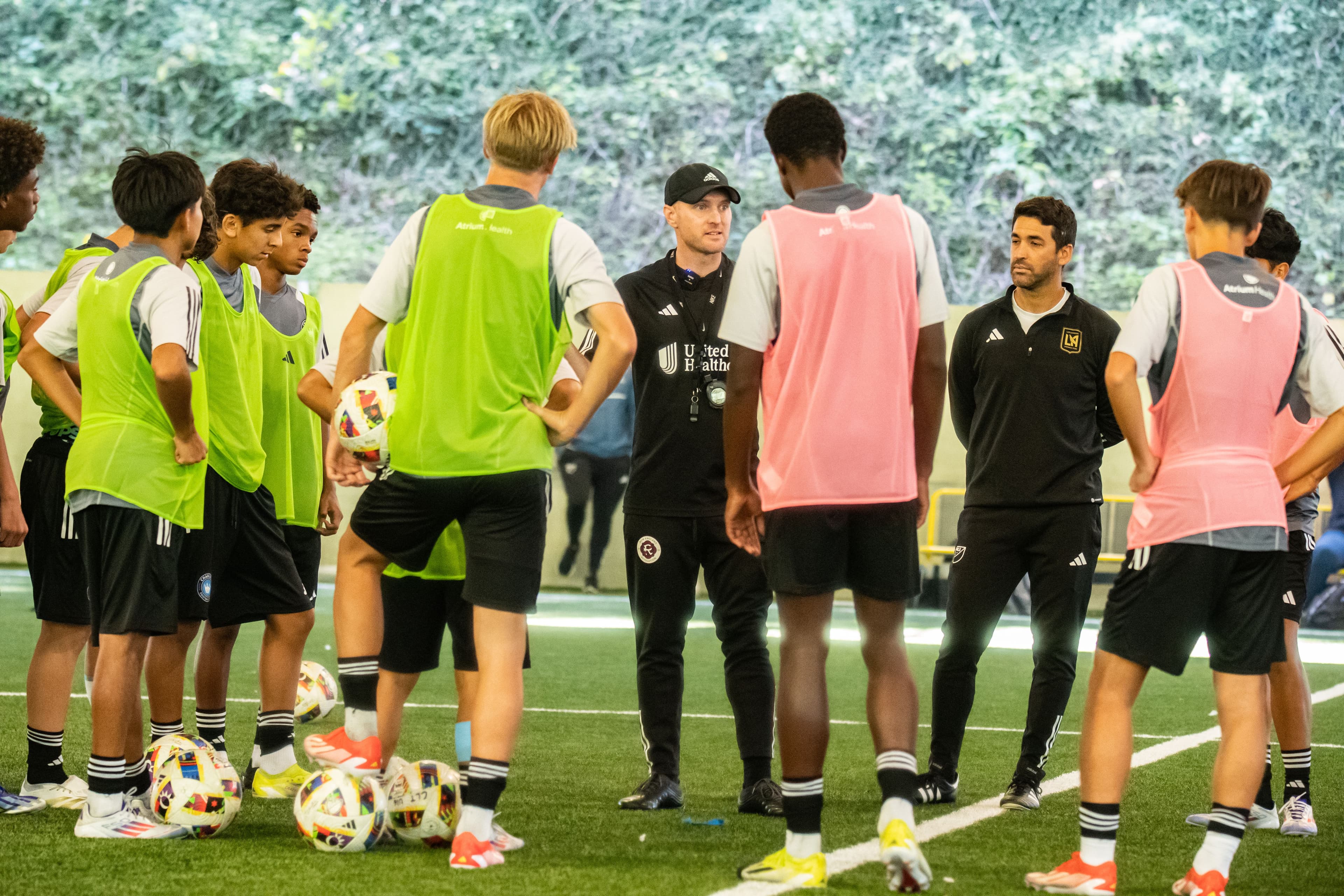Since 2013, the "Elite Formation Coaches License" program has allowed over a hundred coaches from the American league to receive Youth Elite-level training at Clairefontaine.
“How do you feel? What would you change from this practice session to improve it? What was your physical objective? Did you count the number of sprints? Before the training, did you give your attackers cues to avoid being offside?” On the sidelines of the indoor field at the National Technical Center in Clairefontaine, the U17 French National Team coach, José Alcocer, the technical director of Le Havre AC (U6-U16), Mickaël Bunel, and National Technical Advisor Franck Doudet ask a series of questions. Facing them, Steven Sosa, U17 coach at San Jose on the West Coast, carefully responds to the interrogation. For 20 minutes, under the expert eyes of the three judges, he presented his training session, and his pedagogical approach, on the theme of "finding a player running behind the lines." "We evaluate his setup, the repetition of his principle, his attitude toward his players, and his instructional adjustments", explains José Alcocer, as the U16 players from Charlotte FC get set up while receiving some encouragement (Come on!) from another trainee.
Closing our technical and tactical gap with Europe
During the last week of August, 22 youth coaches from MLS academies are working to earn the "Elite Formation Coaches License." They’re part of the fifth cohort of a program launched in 2013 through a partnership between MLS and the FFF. For eighteen months, these North American coaches benefited from the expertise of French coaches and trainers. "For them, it’s like an MBA, the highest academic degree possible in soccer," says Frédéric Lipka, vice president and technical director of the American league for the last twelve years. He initiated the project. "Our goal is to offer our educators the best training to close our technical and tactical gap with Europe and make them experts in player development. In just a decade, the progress has been spectacular."
Game Principles and FC Nantes
In one of the facility's rooms, Erin Ridley, the first woman to pursue the diploma, presented one of the 24 game principles she worked on with her U16s from California this past season: "Breaking the opponent’s pressure line by building out from the back." "Of our 100 goals scored this year, 25% were built up from our defense," she explains, moving between slides, videos, and responses to Mickaël Bunel’s questions on the risks of this tactical approach and using the long ball as an alternative. Minutes later, former Zimbabwean international Patrick Daka (pictured below), U14 coach at Charlotte FC, presents his week-long visit at FC Nantes. “An extraordinary experience” that allowed him to bring “organizational elements and some of the club’s game culture focused on developing work ethic” back to North Carolina. Other clubs, like Lens, Toulouse, Le Havre, Rennes, Strasbourg, and Hoffenheim, also opened their doors to the American trainees.
I’ve grown as a person and as a coach
Field sessions, principles of play assignment, observation reports, experience reports, and technical projects are the five assessments candidates must pass within five days at Clairefontaine. "At the end of the training, if successful, we receive a certificate," explains one of the two French trainees in this cohort, Elliot Prost, U18 coach at Colorado Rapids for four years. "The training is super intense. I’ve grown as a person and as a coach in every area: leadership, emotional intelligence, training planning and execution, and even strength and conditioning." Among the hundred coaches who have benefited from this Franco-American partnership, the career of another Frenchman inspires the 22 trainees: Wilfried Nancy. A trainee in the very first class, the Normandy native has since become an MLS champion.

Frédéric Lipka: "The individual before the team result"
What’s your assessment of this fifth class of the EFCL?
It’s very positive! We’ve seen great progress among our coaches from the start to the final evaluation. Collaborative expertise, leadership, planning… They all possess the essential soft skills for educators. Since 2013, the general knowledge level of the trainees has significantly evolved thanks to this program. The connection between MLS and the FFF is strong; now we’re waiting for feedback from the franchises and their needs to decide if we’ll launch a new class.
What are the main methodological developments of the past 11 years?
There’s now a much stronger focus on technical and educational expertise on the field, whereas management skills used to be the primary focus. The 22 candidates all hold college degrees. In the United States, it’s assumed they already have a foundation in this area, so the emphasis has shifted to on-field skills. The objective: to prioritize individual development over team results. That means first optimizing the player's potential so that, later, they can contribute to their team's success or be transferred by the club.
How would you assess the level of MLS today?
I recently spoke with the U15 coach from TFC whose team played a tournament in Florida. He told me he found the American teams more inclined to play creatively than in France. The academies are heavily influenced by South American coaches like Bielsa or new figures like De Zerbi. As a result, there’s a real desire to play on the ground and build from the back. MLS is still a physical league, but there’s a wide variety of playing styles, from New York Red Bull’s pressing to New York City FC’s more methodical play. The level is progressing rapidly.

How does the EFCL work?
From Clairefontaine in February 2023 to Clairefontaine in August 2024, the training spans 18 months. The trainees attend seven week-long training sessions in person, including one week observing a top-tier European team’s player development practices. They also participate in seminars with academy directors and American coaches. Notably, nearly a hundred MLS or MLS Next Pro coaches (equivalent to a reserve league) have earned their elite coaching license over the past decade.



